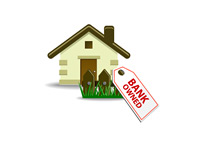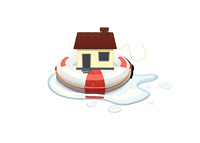Where is the Real Estate Market Going in the United States?
 There is a rule of thumb that is used in the stock market that can easily be applied to the real estate market as well. When everyone is buying, you should be looking to sell. And when everyone is selling, you should be looking to buy.
There is a rule of thumb that is used in the stock market that can easily be applied to the real estate market as well. When everyone is buying, you should be looking to sell. And when everyone is selling, you should be looking to buy.So ok, you might not have sold your home at the top, but now what? You read newspaper articles everyday that fill you with doom and gloom about the real estate market. Prices are dropping, banks are foreclosing on people and supply is flooding the market. What should you do? Where is the real estate market going from here?
First off, there is no singular "real estate market" in the United States. Anyone who announces that "all real estate is going lower" has absolutely no clue what they are talking about. In reality, there are hundreds of thousands of small real estate markets within the border of the United States. Some of these markets, such as Detroit, Miami, etc., are in a decline. There is no doubt about that. However, other areas are still in a "boom." For instance, the price of apartments in Manhattan actually rose in Q4 2007, jumping a healthy 17.6%. Again, the real estate market is similar to the stock market in that you can not just say that the "market is going down." In the stock market, technology stocks might drop, but oil stocks will advance. The point is, just because the market is in an overall state of decline doesn't necessarily mean that your home is dropping in value. It depends on a number of factors.
But what about the overall real estate market? Sure there might be some areas that are still booming, but the majority are in a state of decline. What about those areas? When will they bounce back?
One of the major problems that the real estate market has right now is that there is way too much supply, mainly due to people buying homes that they couldn't really afford in the past two years. Lenders were EXTREMELY loose with their lending criteria, and often people got into homes that they couldn't afford. When the market started to dip, many people simply walked away from their mortgages and the banks were left with all of these homes on their books. If you look at a company like Countrywide Financial, the largest mortgage company in the United States, you will see a massive increase in the number of homes that they foreclosed on. The real estate market won't start to recover until demand starts to catch up with this supply. The problem is that many people now figure that the market will decline even further, and they don't want to buy right now as they figure that the price of the home will be lower in a month or two.
Also, lenders are much stricter in terms of who they will lend money to right now. This means that there are less buyers on the market. So you have a situation where supply is increasing, but the pool of available buyers is decreasing. This is at the heart of the real estate situation in the United States right now.
So how does this get fixed? And when will it get fixed? Can the government do something about this?
Like the price of gold or oil, real estate is an asset, and the asset value is determined by how much someone else is willing to pay for it. In most areas of the US right now, real estate is still priced too high, so there is not too much demand. The only way that demand will start to pick up again is when the values fall to a point where people start to get legitimately interested in buying again. There is plenty of supply to be worked off, but it will get worked off, and demand will pick up again. This is all part of the normal real estate cycle, and is certainly nothing to get too worked up about. Some people think that their house should go up 15% a year, every year. This just isn't the case.
I personally believe that we have another 18-24 months of relative weakness in the overall US real estate market before things start to pick up. The US is likely entering a recession right now, and this will means that unemployment numbers will rise, which will again mean less potential buyers as people will be putting off planned home purchases. When the recession ends in the US and growth starts to pick up, home values will have likely dropped to a point where people start to get interested in buying again. The recession will end, growth will pick up and people will feel optimistic again.
The best advice that I could ever give is to find a home that you love and that meets the needs of your family. If you have a nice home with a great big backyard that is close to everything that matters to you, you won't really care if the market fluctuates. You are comfortable and if you owned the home for the next 20 years, you would be very happy. If you buy and sell homes as investments, then you should be prepared for inevitable downswings in the market.
The market will pick up again, but we've had an amazing run-up over the past number of years, and there is still a lot of excess to be worked off. The people who are willing to put their money and research to work when things seem the bleakest are the ones who will end up doing the best.
Filed under: Real Estate News | General Knowledge



